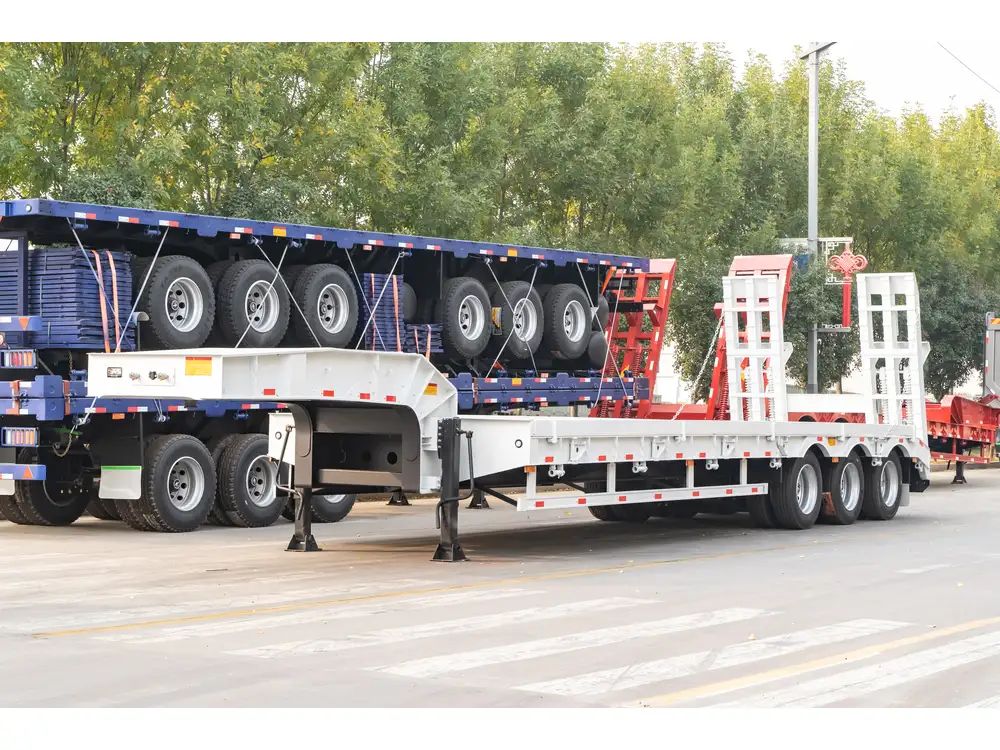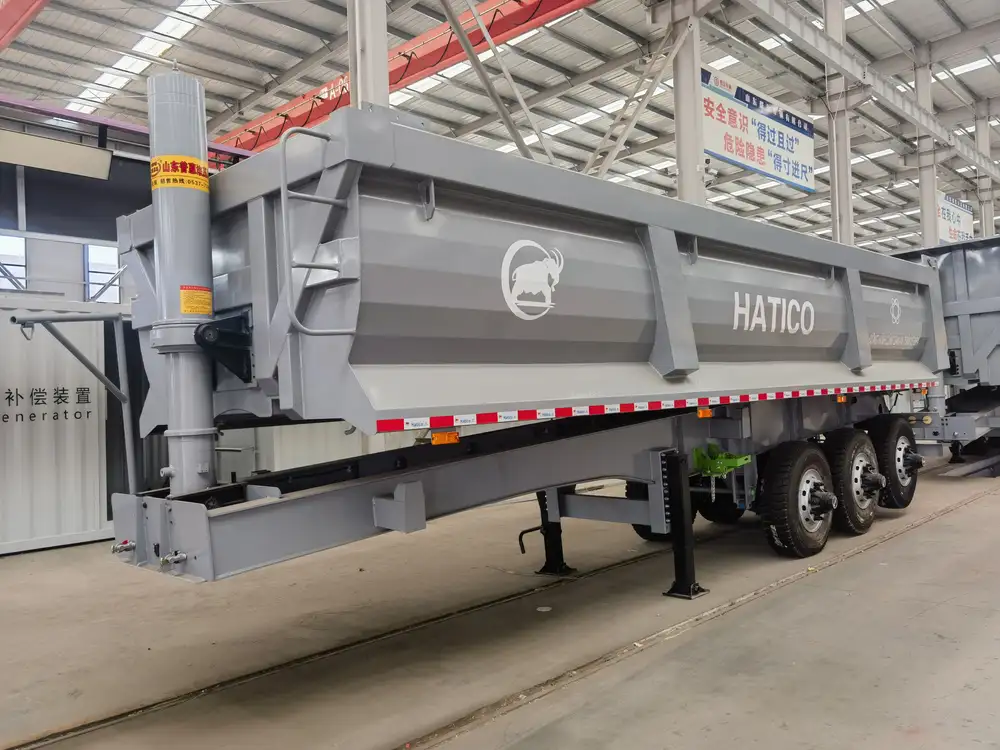When it comes to acquiring a dump trailer, one of the most pressing questions for prospective buyers is: how long can you finance a dump trailer? Understanding the financing options available is crucial for businesses and individuals alike, as it enables informed decision-making regarding budget allocation, cash flow management, and overall investment strategy. This comprehensive guide will delve into various financing terms, explain factors influencing loan durations, and provide alternative financing options that can suit diverse needs.
Understanding Dump Trailer Financing
What is a Dump Trailer?
A dump trailer is a specialized trailer designed to transport loose materials and facilitate unloading through a hydraulic lift mechanism. Commonly used in construction, landscaping, and agricultural applications, these trailers enhance operational efficiency by enabling swift loading and unloading of heavy materials such as dirt, gravel, and debris.

Importance of Financing
The financial landscape surrounding dump trailers can be daunting. High upfront costs necessitate a careful approach to financing. Buyers need to navigate through various options, rates, terms, and conditions preferences amid an array of lenders, from banks to specialized equipment financing firms.
Standard Financing Terms for Dump Trailers
Typical Loan Duration
The financing duration for dump trailers typically ranges from 24 to 84 months. However, lenders may cater to requests for longer durations based on individual circumstances, creditworthiness, and specific needs.
| Loan Term | Monthly Payment | Total Interest Paid | Best For |
|---|---|---|---|
| 24 Months | Higher | Lower | Businesses needing quicker ROI |
| 36 Months | Moderate | Moderate | Balanced approach for buyers |
| 48 Months | Lower | Higher | Long-term investment considerations |
| 60 Months | Very Low | Significantly Higher | Lower monthly cash outflows |
| 72+ Months | Minimum Payments | Substantially Higher | Borrowers with longer investment returns |

Factors Influencing Financing Terms
Credit Score:
- Lenders assess credit scores to evaluate risk. A higher score typically equates to lower interest rates and more favorable terms.
Down Payment:
- The size of the initial down payment affects loan terms. Larger down payments can lead to more competitive financing options.
Trailer Cost:
- The total cost of the dump trailer influences financing availability and terms. Higher ticket items may allow for extended terms.
Business Age:
- Established businesses often receive more favorable loan terms than startups or newer enterprises.
Income Stability:
- Lenders analyze income stability or cash flow, as it reflects a borrower’s ability to make regular payments.
Exploring Loan Types
1. Traditional Bank Financing
Traditional banks offer business loans, which may include dump trailer financing. These loans typically involve a comprehensive application process encompassing financial statements, personal credit checks, and collateral assessment. However, they often provide competitive interest rates.

2. Equipment Financing
Specialized equipment financing companies focus on the acquisition of machinery and vehicles. With a streamlined application process, they may offer terms specifically tailored to construction or industrial equipment buyers.
3. Lease-to-Own Programs
Lease-to-own options allow buyers to lease a dump trailer with the option to purchase it at the end of the lease term. This route can be beneficial for businesses looking to preserve cash flow while eventually owning the equipment.
Pros and Cons of Lease-to-Own:
| Pros | Cons |
|---|---|
| Lower upfront costs | Potentially higher overall costs |
| Flexibility in new equipment options | Ownership transfer at end of term |
| Options for maintenance coverage | Commitment to long-term payments |
4. Personal Loans
For individuals or businesses with strong credit histories, personal loans can provide an alternative pathway to financing. However, interest rates may be higher compared to traditional business loans, and terms can vary widely.

5. Seller Financing
In some cases, the seller may offer financing options. This arrangement can simplify the purchase process and may provide more flexible terms than a bank or leasing company.
Analyzing Longer Financing Terms
While typical financing spans 24 to 84 months, some lenders may permit terms extending to 120 months or longer, particularly for high-cost commercial equipment. Longer terms can provide smaller monthly payments, but borrowers should be wary of higher overall costs due to protracted interest accumulation.
Calculating Total Cost
When assessing financing lengths, evaluating the total cost of the dump trailer over the term is vital. The formula for calculating the total cost of a financed purchase is:
[ \text{Total Cost} = (\text{Monthly Payment} \times \text{Number of Months}) + \text{Down Payment} ]
Example Calculation
Let’s consider an example of a dump trailer financed for five years with a total purchase price of $30,000, a down payment of $5,000, and a monthly payment of $500:
- Total Payments: $500 × 60 months = $30,000
- Total Cost: $30,000 + $5,000 = $35,000
Thus, the borrower will pay $35,000 for a $30,000 trailer across five years, including financing costs.
Other Financing Considerations
Flexible Payment Options
Many lenders allow for flexible payment options to accommodate varying cash flow situations. These might include:
- Seasonal Payments: Higher payments during peak seasons and lower during off-seasons.
- Deferred Payments: Initial months without payments.

Interest Rates
- Fixed vs. Variable Rates: Fixed rates remain unchanged throughout the loan term, while variable rates may fluctuate based on market conditions. Borrowers must consider risks associated with each type.
Taxes and Deductions
Under U.S. tax law, equipment financing can have significant tax benefits:
- Section 179 Deduction: Businesses can deduct the full purchase price of qualifying equipment purchased or financed during the tax year.
- Depreciation: Businesses may also depreciate the trailer over its useful life, potentially lowering taxable income.
Conclusion & Recommendations
In the quest to finance a dump trailer, understanding the intricacies of loan duration and options is essential. With terms varying from 24 to 84 months and even beyond, buyers must weigh their needs against total costs. For those uncertain about financing options, reaching out to various lenders, obtaining multiple quotes, and consulting with financial advisors can provide clarity and facilitate optimal decision-making.

What’s Next?
- Explore different lenders and financing structures for personalized insights.
- Analyze your own cash flow and credit profile to understand what financing options would be available.
- Consult a tax professional to comprehend potential tax implications and benefits related to the financing of a dump trailer.
By arming yourself with this knowledge, you can navigate the dump trailer financing landscape with confidence, making informed choices that best suit your needs and financial situation. Ultimately, whether it’s a traditional bank loan, lease-to-own agreement, or seller financing, the right approach can pave the way for successful equipment acquisition, keeping your operations moving smoothly and efficiently.



